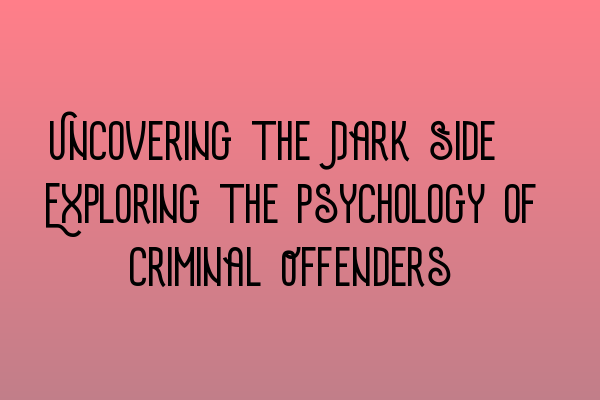Uncovering the Dark Side: Exploring the Psychology of Criminal Offenders
Understanding why individuals engage in criminal activities has long been a subject of fascination and intrigue. The psychology of criminal offenders is a complex field that requires deep exploration. In this article, we will delve into the dark side of human behavior and uncover the underlying factors that contribute to criminal offenses.
The Roots of Criminal Behavior
Criminal behavior is shaped by a multitude of factors, including individual characteristics, familial influences, and societal pressures. Some offenders may have a predisposition towards criminality due to genetic or neurological factors, while others may be influenced by their upbringing and environment. Research has shown that a combination of genetic, environmental, and psychological factors contributes to criminal behavior.
In order to fully comprehend the psychology of criminal offenders, it is essential to examine various theories that attempt to explain their motives. Theories such as the social learning theory, strain theory, and rational choice theory provide valuable insights into the underlying motivations behind criminal acts. By exploring these theories, we can gain a better understanding of why individuals choose a life of crime.
The Role of Psychology in Criminal Profiling
Criminal profiling is a technique used by law enforcement agencies to assist in identifying and apprehending criminals. Psychological profiling plays a crucial role in this process, as it helps investigators gain insights into the mindset and behavioral patterns of offenders. By analyzing the crime scene, victimology, and other relevant factors, profilers can create a profile that narrows down the pool of potential suspects.
Psychological profiling draws upon various fields, such as forensic psychology, criminology, and behavioral analysis. It utilizes psychological principles to predict the characteristics and behaviors of individuals who are likely to commit certain types of crimes. This powerful tool aids law enforcement agencies in their relentless pursuit of justice.
Treatment and Rehabilitation of Criminal Offenders
While understanding the psychology of criminal offenders is crucial in investigating and preventing crimes, it also plays a vital role in their treatment and rehabilitation. Rehabilitation programs aim to address the underlying issues that contribute to criminal behavior and help offenders reintegrate into society.
Psychological interventions, such as cognitive-behavioral therapy and anger management programs, are commonly employed in the rehabilitation process. These interventions enable offenders to develop healthier coping mechanisms, improve their decision-making skills, and ultimately reduce their risk of reoffending.
Conclusion
The psychology of criminal offenders is a multifaceted subject that requires a comprehensive understanding of various factors. By exploring the roots of criminal behavior, the role of psychology in criminal profiling, and the importance of rehabilitation, we can gain valuable insights into the minds of those who choose a path of crime.
To continue your journey into the fascinating world of criminal law, we recommend checking out these related articles:
– SQE 1 Practice Exam Questions
– SQE 1 Practice Mocks FLK1 FLK2
– SQE 2 Preparation Courses
– SQE 1 Preparation Courses
– SRA SQE Exam Dates
Expand your knowledge and uncover the mysteries behind criminal behavior with SQE Criminal Law & Practice Law UK.
